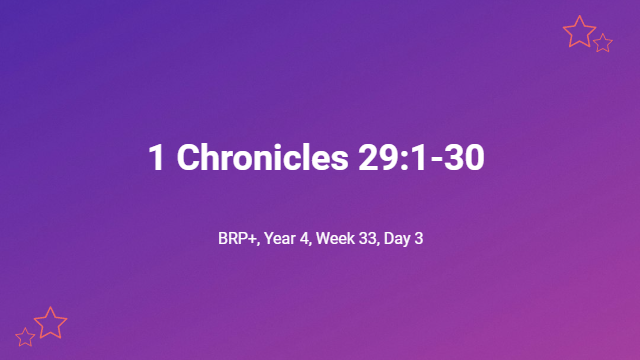1 Chronicles 29:1-30
Q.1. Why did King David store up so much wealth? How did the people respond to David’s generosity? What impact does generosity towards God bring? – (1 Chr.29:1-9)
David had fought long and hard to establish himself and the nation above all others. In the process, he had amassed a small fortune. Yet David never lost sight of the objective – In my delight in the house of my God, the treasure I have of gold and silver, I give to the house of my God, over and above all that I have already provided for the holy temple (1 Chr.29:3). Even in his old age, he remembered in detail all that he had set aside for God’s temple. He then challenged his people to give generously to the task of building a temple that reflected the greatness and glory of God. The response of the leaders and the people was joyous and generous. This brought overwhelming gladness all round – Then the people rejoiced because they had offered so willingly, for they made their offering to the Lord with a whole heart, and King David also rejoiced greatly (1 Chr.29:9). Generosity invariably blesses the givers as well as the receivers, and gladness the heart of God.
Q.2. How did David view God, and how did he see himself? What is the lesson for us? – (1 Chr.29:10-22)
David was about to die (1 Chr.29:28) and go to be with his God. His view of God, and his devotion to God were clear – 11 Yours, O Lord, is the greatness and the power and the glory and the victory and the majesty, indeed everything that is in the heavens and the earth; Yours is the dominion, O Lord, and You exalt Yourself as head over all. 12 Both riches and honour come from You, and You rule over all, and in Your hand is power and might; and it lies in Your hand to make great and to strengthen everyone (1 Chr.29:11-12). As well as his generous offering to the temple, David added rich praise to His God. He acknowledged that it was only because of God’s goodness to him that he could give anything at all (1 Chr.29:14). David was the king, indeed the greatest king of his time, yet he entertained no exaggerated opinion about himself – For we are sojourners before You, and tenants, as all our fathers were. Our days on the earth are like a shadow, and there is no hope (1 Chr.29:15). The king and his subjects were all just travellers passing through life. He was just a tenant and steward, called to be faithful to the supremely Faithful One. He was given an earthly kingdom, but he recognized – Since I know, O my God, that You try the heart and delight in uprightness … (1 Chr.29:17). On top of the treasures he contributed for the building of the temple, David marked the day with further sacrifices and a celebration with his people.
Q.3. What was David’s prayer for Solomon and the nation? How did God respond to David’s prayer? – (1 Chr.29:18-19, 22-25)
Abraham, Isaac, and Jacob had been promised a land, but they never possessed it. David prayed that Solomon would fulfil all the wonderful plans God had for His people – give to my son Solomon a perfect heart to keep Your commandments, Your testimonies, and Your statutes, and to do them all, and to build the temple, for which I have made provision (1 Chr.29:19). On this significant day of consecration, Solomon was again anointed as king by Zadok, the High Priest. Not only did the people swear their allegiance to Solomon, but – The Lord highly exalted Solomon in the sight of all Israel and bestowed on him royal majesty which had not been on any king before him in Israel (1 Chr.29:25).
Q.4. How did David’s life end? Why was the role of the prophets crucial? – (1 Chr.29:26-30 c.f. 2 Pet.1:20-21)
David’s life ended significantly better than did the wise King Solomon’s. The chronicler recorded – Then he died in a ripe old age, full of days, riches, and honour; and his son Solomon reigned in his place (1 Chr.29:28). David showed all the normal signs of old age (he had to be kept warm) … He had been unaware of his son, Adonijah’s attempts to succeed him as king, until he was told by Bathsheba and Nathan the prophet (1 Kgs.1:1-37). Nevertheless, he was perfectly able to accurately pass on the plans that God gave him for the Temple, and the details of the riches that he had placed in the treasuries. His prayer to his God showed an ongoing relationship with the Lord. The prophets Samuel, Nathan, and Gad, as all the prophets of God, were not just charismatic leaders, but were educated men who knew the sacred writings, and contributed towards them as they were moved by the Spirit of God (1 Chr.29:29 c.f. 2 Pet.1:21). John the Baptizer is often portrayed as this rough diamond who lived out in the wilderness. That is true, but John was raised by his godly parents (His father Zacharias was a priest) and was taught the Scriptures in the synagogue as was Jesus. He constantly quoted the Scriptures in order to support his ministry as the forerunner of Messiah, Jesus.

